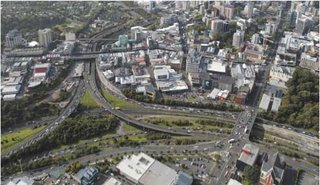
Capitalism is so awful isn't it, far better to totally reject it and adopt an approach where the profit motive is eliminated, there is full employment, everything is owned "by the people" and everyone works for the "common good". Well this photo is the result - this the success of complete socialism - North Korean style. Malnourishment of children. Meanwhile, it is developing missiles. It is of mindblowing hypocrisy that the left condemns the US for poverty and militarism, when Americans do not starve, do not get thrown in gulags at the slightest hint of opposing the regime and are not prevented from leaving, but pays little attention to the utter horror of North Korea.
.
While Iran remains the number one focus of concern with nuclear proliferation, North Korea remains the biggest puzzle. 56 years ago on Monday, North Korea launched its overwhelming attack on South Korea following the US withdrawal of troops from the South, and with the egging on of Stalin and Mao. It continues to deny that this is what happens, despite Soviet archive evidence confirming it. North Korea has admitted that it has nuclear weapons, whether or not this is a bluff is unclear, and will remain so until North Korea conducts a test. Hopefully that will not happen.
.
North Korea is an enormous threat to South Korea, Japan and the US. It has a standing army of 1 million vs 650,000 in South Korea, and you can be sure that after the top echelons of the leadership and the secret police, the armed forces get fed and looked after. Sure it does not have the high tech weapons systems that the US possesses, but it does not really need them. It would take half an hour for North Korean troops to reach Seoul by road, and under ten minutes for missiles to hit it. It possesses large stockpiles of chemical and biological weapons, and one of its biggest exports is arms. There is little doubt that North Korea has the potential to kill millions in South Korea in days, either as a first strike or in response to any military attack.
.
That is why an attack on North Korean military facilities is out of the question. It would almost certainly start a second Korean War, and you can be sure that not only South Korea, but Japan and possibly Alaska or Hawaii would also be subjected to attack (although I would bet on US ABM capabilities over North Korean missiles anyday). The cost in lives in South Korea and Japan would be enormous, and hardly worth it. North Korea has sabre-rattled for decades, launched minor border skirmishes, attacked boats and engaged in terrorism (although that ended after the Cold War) , but has not launched another war and its number one motive is survival. Kim Jong Il is no fool - he knows that if he launched any attack on the south, he is finished if he launched a nuclear attack, the US, south Korea and a substantial coalition of the willing would finish off North Korea. China would not step in to save him.
.
He is using nuclear weapons to do two things. Firstly, to deter an Iraq style attack by the US. While the odds of the US attacking first have always been very remote, nuclear capability rules it out. Remember this nuclear capability was being pursued well before this Bush administration, and reflected more the end of security guarantees from the USSR and China, and the evidence from the Gulf War of US military superiority over the 1960s era military of Iraq.
.
Secondly, North Korea wants to be noticed. Its economy is virtually bankrupt, the majority of its GDP is sucked into the armed forces, which keep a significant portion of the population mobilised against the pretend foreign threat (keeps them from local issues) and much of the rest is sucked into propping up the elite (Kim Jong Il has been the world's largest individual buyer of Hennessy), and the resources poured into monuments and propaganda. It wants aid, it wants technology and it wants investment. If it did not pose a military threat, most of the world would quietly ignore it and wait for the regime to collapse.
.
So what can be done? If you cannot attack North Korea, you can either maintain an icy Cold War against it, attempting to undermine it, or engage and try to reform the regime through incentives. The former means letting it gradually fall over, with the possible risk that in its dying days it lashes out with the military to bring down the south with it, the latter means using government aid to, inevitably, boost the wealth of the oppressors, rather than the oppressed.
.
The first priority is to retain a tough defence and deterrence, making it clear that any North Korean first strike will mean the end of North Korea's regime. Following that needs to be espionage, to infiltrate the regime, assisting dissidents, dropping radios into the country on balloons so that the people can listen to south Korean radio and engage in a quiet process of undermining the regime. Thirdly, it is aid on our terms. Let non government agencies enter North Korea to deliver aid personally to those who need it so it is not diverted.
.
Finally, dialogue. Dialogue that is not like the statement at the end of this post, but is about being realistic, behind closed doors, about the regime's long term future - this means opening up, trade zones and closing the gulags. Remember, virtually none of this dialogue will be with Kim Jong Il directly, but with others who could be a great asset if they believe the West has good will towards Korea and Koreans. The only future for North Korea is to change, to open up, and allow its brutalised, oppressed people to be freer, and to be re-educated in how to function in such a society. Give them property rights, give them choices and give them a chance to learn about their various areas of expertise/interest - instead of spending time each day learning turgid bullshit about Kim Jong Il and propaganda about the regime.
.
A plan has to be developed to allow them to become free - the worst options are military attack or to wait until it collapses to respond. An attack will be unbelievably costly while it is so heavily armed and so capable of killing millions - a collapse will risk the mistakes of parts of the former USSR- anarchy dominated by the emergence of organised criminals (ex party/army) with the means to impose order.
.
Oh and you think the regime cares? Well read this - it is most of a press release from the Korean Central News Agency, commenting on a high level defector's remarks about the human rights abuses in the country - the language is hilarious, and says a lot about how bizarre the world view in Pyongyang actually is. Imagine any other government using such terms to describe anyone, I have put the most outrageous in bold. Hwang Jang Yop was once President of Kim Il Sung University and Chair of the Supreme People's Assembly:
.
"U.S. hard-line conservatives were reported to have arranged the visit of ugly-looking Hwang Jang Yop to the U.S. from October 27 to November 4 for such anti-DPRK burlesques as "hearing", "interviews" and a "lecture." They took him to different places to let him make malignant remarks such as "dictatorship abusing human rights" and solicit the U.S. not to offer any "security assurances" so that the political system in the DPRK may "collapse."
.
As already known, Hwang, by nature, is human scum as he defected to the south in quest of profligacy and his own pleasure leaving behind his own family and relatives and unhesitatingly betraying his own motherland that had protected his own life. It is not hard to guess what such a runaway would say as he has inveterate bitterness towards the system in the DPRK. His jargon is the shrill cry on his deathbed.
.
What matters is that the neo-conservatives in the U.S. earnestly waited for him and arranged all sorts of "interviews" almost everyday during his visit to hear that dirty and silly guy talk nonsense. Leading members of the International Relations Committee of the House of Representatives, senior officials of the State Department and leading officials concerned of the Department of Inter-Security and other neo-conservatives in the U.S. vied with one another to hear him just as bluebottles gathered around rotten meat.
.
They seemed to have nothing to do. They arranged "hearings" one after another to listen to Hwang who can hardly be considered as a human being as he is unable to make an objective judgement of reality, bereft of faculty of independent thinking. This is really enough to make even a cat to laugh. It is deplorable that those who puff themselves up in the political circle in the U.S. behaved so. This proves that they are worse than Hwang, the human trash without an equal in the world.





